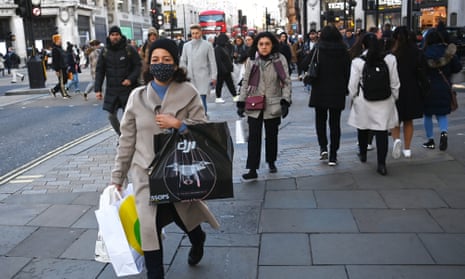Shoppers face the biggest price rises in more than 30 years this Christmas after fears of widespread shortages sent people rushing to the shops this month.
According to a survey of retailers by the CBI, the threat of empty shelves caused a high street sales boost in November, despite sharply escalating prices.
The CBI said its monthly retail sales balance, which asks retailers to say if annual sales growth is rising or falling, rose to a three-month high of +39 in November from +30 in October.
CBI economist Ben Jones said: “Christmas seems to have come early for retailers, with clothing and department stores in particular seeing a big upward swing in sales volumes in November.”
Most businesses were also increasing prices compared with the early summer, he said. The balance of firms passing on rising production costs moved up from +16 in May to +77, the highest level recorded by the sales barometer since 1991.
Buoyant sales and higher prices are likely to increase pressure on the Bank of England for an interest rate rise when officials meet next month.
They are expected to increase the base rate from 0.1% to 0.25% on concerns that workers will demand higher wages to compensate for higher prices.
Earlier this month, the Office for National Statistics reported consumer prices index inflation had risen 4.2% over the year to October and the BoE said it was heading to 5% next year.
Jones said that while the survey of retailers indicated stock levels were adequate for the first time in seven months, previous reports of shortages of some goods appeared to have caused shoppers to panic and make their festive purchases earlier this year, though retailers predicted the sales boom would continue into December.
“Overall, retailers are becoming more optimistic, with both employment growth and investment intentions picking up strongly. Cost pressures remain a very real concern, however,” Jones said.
The surge in sales comes amid forecasts that the discount day Black Friday will spur shoppers to spend almost £9.2bn this weekend – 15% more than in 2020 when much of the UK’s high street was in lockdown.
Highlighting the uncertainty surrounding the behaviour of shoppers, a study by the Institute for Fiscal Studies earlier in November suggested that a Christmas spending spree was unlikely to materialise despite consumers having around £150bn of savings on deposit to splash on toys, food and festive parties.
Savings built up during the pandemic would remain in household bank accounts until the economic outlook was more upbeat, it said.
Samuel Tombs, chief UK economist at Pantheon Macroeconomics, cautioned that the high levels of consumer demand charted by the CBI were flattered by comparison with unusually low spending last year.
“Looking ahead, higher CPI inflation, coupled with the withdrawal of government support [the £20 uplift in universal benefit] at the end of the third quarter, will weigh on real disposable incomes,” he said.
